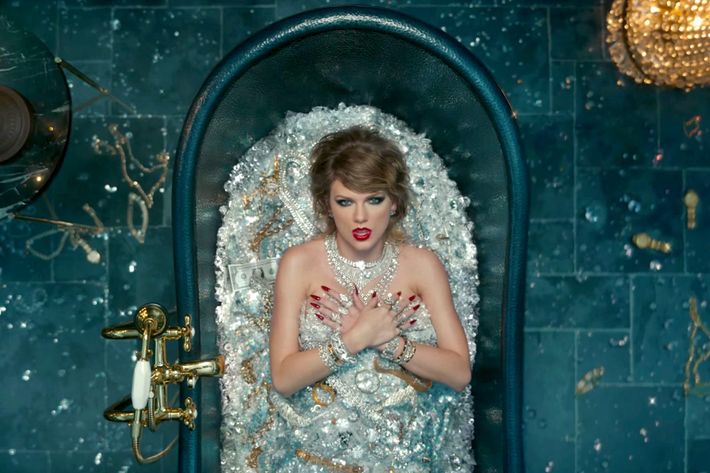
The first time I listened to “Ivy,” the second track on Frank Ocean’s Blonde, it was night and I was walking home along Prospect Park West, and without warning, I burst into tears right there on the sidewalk. I felt broadsided by it, a song that is itself about being broadsided by a love. “I thought that I was dreaming when you said you loved me,” Ocean sings, unadorned. There are so many songs about working up the nerve to get someone alone and tell them your true feelings, there are relatively few about how it feels to be told you’re liked. How it can feel strange, like getting a gift out of the blue when it’s not your birthday. How we’re not trained to expect softness and affection from others. The song’s reverb-y guitar line sounds exposed, out on a tightrope. “I had no time to prepare, I couldn’t see you coming.”
“State of Grace,” the first song off Taylor Swift’s 2012 album Red, is a song I heard many times before it finally made me burst into tears. I kind of glossed over it for a while, thinking it sounded as pleasant and uplifting as any other Cranberries’ “Dreams” soundalike. A great song for cleaning the house to. When I went to the L.A. stop of her Red Tour, the first stadium pop show I had ever been to at the ripe old age of 28, she opened the show with it, and it seemed to me a mere tool, perfectly calibrated to whip up the audience of mostly preteen girls and their moms into a semi-religious frenzy. But then one day in 2014, driving home from work one day through downtown Los Angeles, I put it on and completely inadvertently started sobbing. Maybe it was that I was in a relationship at the same early, anything-can-happen stage Swift is singing about, maybe it sounded comparatively unguarded in the coming shadow of “Shake It Off” and Swift’s increasingly cynical, “100 percent pure pop” personality. “I never saw you coming,” Swift sings, stretching the last syllable to seven soaring notes. The ability to feel surprised is a dwindling resource; she’s trying to stretch it out as long as possible.
In 2012, the year of Red’s release, Swift was reaching her expiration date as the girl who Never Saw It Coming as a personal brand. The Taylor Swift Surprise Face, a human emoji of ingenuous “who, me?” shock, no longer behooved an artist of her vast cultural impact. “It’s Time for Taylor Swift to Retire Her Surprised Face,” declared cultural arbiters BuzzFeed in April of that year. And she took the cue; it’s hard to find a genuine, non-self-mocking instance of the look after 2013. (An amount of research I’d rather not disclose has me 99 percent sure it’s this brief instance, during her shared Grammy win with the Civil Wars for the Hunger Games song “Safe and Sound.”) By the time her next album, 1989, rolled out, the “State of Grace” counterpart was album-opener “Blank Space,” a song that is absolutely about seeing it coming. With its Max Martin Diet-Trap beat, it’s a song about beginnings that is arch where “State of Grace” is earnest, a song that expects the worst from everyone, including its own pen-snapping narrator.
I’ve been thinking a lot lately about what a gift it is to be taken by surprise, especially by love. Some of my favorite films of this year have explored the deceptively simple, unguarded experience of falling in love for the first time — Call Me by Your Name, Lady Bird, and Princess Cyd all revel in their protagonist’s naïveté, and treat it as a virtue rather than a weakness that needs to be “retired.” I find the same vulnerability on “Ivy,” not despite, but because of Ocean’s general world-weariness. Being in awe of another person, rather than waiting for them to fuck up, is a rare treat these days. Maybe that’s why it’s been striking such a profound note in popular narratives.
Red is the last Taylor Swift album to share that sentiment; in fact, you can hear the shift happening on the album itself. You hear Swift’s preoccupation with other people’s perception of her start to take hold, both in terms of the public at large (the “Who’s Taylor Swift anyway? Ugh!” aside in “22” is a petty low point that would be followed by many more in the coming years) but also how she looks in her all-but-named ex-lover’s eyes. The album’s emotional centerpiece “All Too Well” spends a lot of its time in the second person, and closes with the ex smelling Taylor’s left-behind scarf “’cause it reminds you of innocence.” The song is cinematic enough that it’s easy to miss how wild this beat is, how incredibly bold it is to imagine the guy who dumped you smelling your stuff and kicking himself for losing you. It’s almost as wacky as the part in “Trouble” where she surmises that because her ex never loved her, that he never loved anything. (A friend who had a particular bone to pick with this song was aghast: “Not even his mom? Not even pizza?”) The story-song tradition in country music has always set up scenes and played with perspectives other than the singer’s, but Swift still puts herself at the center of every frame.
She hasn’t stopped holding up that mirror since. Red becomes a more and more fascinating collection of work to return to as Swift’s career evolves — it has revealed itself to be the tipping point that determined what kind of grown-up songwriter she was going to be. I can’t help but find it a little unfortunate that, for the past few years, she seems to have determined a dichotomy where sincerity and optimism = immaturity, and jaded self-awareness = strength. We’ve all been there. It’s an easy mistake to make in your 20s. But my 30-something self still keeps coming back to Red for its moments of vulnerability, which feel wise beyond the 22 years Swift was when she wrote the album.
But Swift can use that self-awareness for good. I have a soft spot for Fearless’s “Fifteen,” in part because of the way it ineffably captures the sad, sometimes scary feeling of being the titular age. And Red’s title track — coming right on the heels of “State of Grace”’s unhindered in-the-moment optimism — similarly feels as if it’s a story being told months, maybe years, after the album’s central love affair. It’s my favorite song on the album.
Swift’s a born storyteller; from her marketing to her use of celebrity gossip columns, her ability to tease out a sense of before and after with relationships and record cycles is part of the experience. “Red,” with its high-school-poetry, colors-as-emotions premise, mythologizes itself and feels everything at once, without a hint of the regret that peppers so much of the rest of the album. “Loving him was red,” is the refrain, prefaced with a “but” to emphasize that it was all worth it.
It reminds me now of Michael Stuhlbarg’s beautiful, thesis-making speech near the end of Call Me by Your Name, as he’s comforting his character’s son, Elio (Timothée Chalamet), after the summer romance that has left Elio in emotional tatters. “You’re feeling a lot of pain and sorrow right now,” he says (and I’m paraphrasing). “But don’t erase it, along with the joy you felt.” He’s speaking from the perspective of someone who’s old enough to know, addressing someone still bruised and brooding and in the thick of it. The Taylor Swift of Red (and “Red”) may be feeling 22, but she can also imagine what it’s like to be 52, checked out of the reputation game and tending her rose garden and maintaining healthy platonic friendships with all her exes. And she can look back on the time when she still never saw it coming, and sing about it like that.






